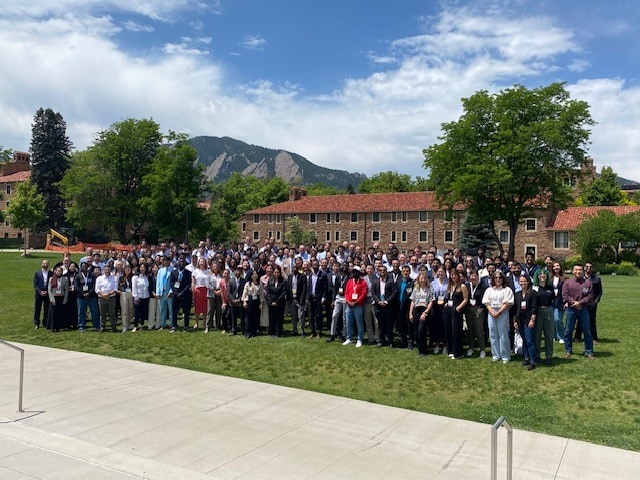Warren W. Wolf, 1941–2014. (Credit: ACerS.)
The Society learned with sorrow that former president Warren W. Wolf died Friday, April 25, from head injuries suffered earlier this month. Wolf, of New Albany, Ohio, was 72 years old.
Wolf served as ACerS president from May 2005–October 2006—the longest term in modern times—as a result of the transition of the Annual Meeting from May to October to align with MS&T.
His succession through the three presidential offices (president-elect nominee, president-elect, and president) coincided with a precarious time at the Society. Glenn Harvey, Society executive director from 2003–2006, says, “The Society (in 2003) was in worse financial shape than people realized. Warren was one of only a few industry people on the Board at the time, and he understood the business and financial aspects of the situation.”
The Board took several bold steps to address the financial crisis, such as “right-sizing” the facilities and entering into publishing partnerships, during which, Harvey says, “Warren was the backbone in the transitions that were taking place.”
“I have always regarded Warren as one of the truly great presidents of ACerS because of his service to the Society at a time of maximum need,” adds David Pye, also a former ACerS president.
By 2005, Wolf reported in a Bulletin interview that the Society had retired all of its debt and had a “bottom line…even further in the black than projected.” The newfound fiscal stability allowed Wolf to implement the Society’s 2005–2010 strategic plan, which included taking advantage of emerging opportunities, promoting ACerS’ value to corporations and students, reinvigorating the Bulletin and its Editorial Advisory Board, and starting two new events. Those events remain active today—the International Conference on Ceramic Interconnect & Ceramic Microsystems Technologies, and the first International Congress on Ceramics.
The Society made what Wolf called “two major, future-setting decisions” during his tenure: establishment of the Ceramics Publishing Company to serve the art ceramics community, and investment in web-based infrastructure to create and power ceramics.org. Charlie Spahr, ACerS executive director, says these were pivotal decisions. “These two decisions enabled the Society and CPC to grow and thrive and serve the information needs of our members and customers,” he says.
Wolf had a keen understanding of the relationship between industry and academia, and Pye credits him with leading the effort to establish a NSF Center for Glass Research at the College of Ceramics at Alfred University. In addition, he served on advisory boards at Virginia Tech and Ohio State University. His commitment to education and the Society was on the verge of taking a new direction. According to Spahr, “The Society was a passion of his, and Warren was just beginning to help with our Ceramic and Glass Industry Foundation. His experience and wise counsel will be missed.”
Wolf earned his BS in ceramic engineering from Pennsylvania State University, PhD from Ohio State University, and MBA from Xavier University. He spent 33 years at Owens Corning, joining the company in 1968 as a senior scientist at the Science and Technology Center in Granville, Ohio. He retired in August 2001 as vice president and chief scientist of science and technology, after having held a succession of research and management positions.
An innovative scientist, he holds 15 patents in the area of glass fiber manufacturing processes and compositions. Wolf’s research into understanding the human health issues relating to glass fibers in lung tissue led the International Association on Research in Cancer to reverse its opinion and remove biosoluble glass fibers from its list of possible carcinogens. The glass industry recognized this work and his leadership in glass science with the Phoenix Award at a gala celebration in 2006.
Harvey says Wolf had “an unusual combination of an extremely strong technical and scientific background blended with a strong grasp of business.” He generously applied these gifts to the benefit of the global glass and ceramics community as a contributor to the Glass Manufacturers Industry Council, the International Commission on Glass, the International Ceramics Federation, and the National Institute of Ceramic Engineers.
“Warren’s leadership will always be remembered for clarity of thought and expression, integrity, and above all, wisdom to see the way forward in matters before him,” Pye says.
David Green, ACerS president, speaking on behalf of all, says, “The Society extends its heartfelt condolences to Warren’s family. Much of the success the Society enjoys today traces back to his leadership, not just as president, but also as a leader in industry. Those of us who had the honor to work with him will miss his insight, vision, and passion for the Society.”
Wolf is survived by his wife Linda, seven children, seven grandchildren, and one great-grandchild.
Author
Eileen De Guire
Spotlight Categories
- Member Highlights



